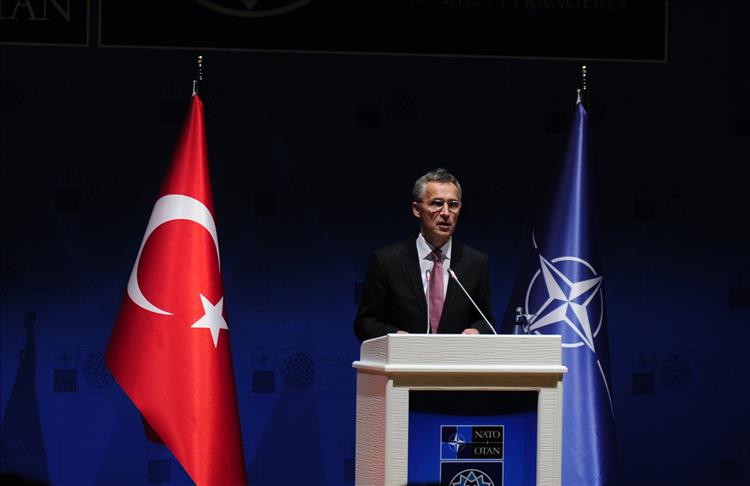
ANTALYA, Turkey
NATO will continue to protect and defend every ally against any security threat, NATO Secretary-General Jens Stoltenberg said Thursday.
Before the North Atlantic Council meeting, Stoltenberg made the opening remarks at the final day of the NATO foreign ministers meeting in Turkey’s southern province of Antalya.
"Today, we will discuss the evolving security challenges in our eastern and southern neighborhoods. To the East, a more assertive Russia has acted to change borders and intimidate neighbors. To the south, turmoil and violent extremism have reached a level unprecedented in modern times," he said.
He said: "In this more dangerous security environment, NATO will continue to protect and defend each ally against any threat. That is why we are adapting our alliance to a new environment and implementing the greatest reinforcement of our collective defense since the end of the Cold War."
On Thursday, NATO's Supreme Allied Commander in Europe, Philip Breedlove, said that Turkey's borders were NATO's borders.
Visiting the Spanish unit and its Patriot missile systems deployed at the Incirlik base in southern Adana province, Breedlove praised Turkey's contributions to the North-Atlantic security group, saying that the missiles deployed there was part of NATO's mission to defend its members.
"Security continues to bear significance for our mission," Breedlove said.
Asked about the Patriot missiles' failure to defend the Turkish territory against bombs landing in Turkish border towns -- the most prominent example of which was the Reyhanli attack that killed over 50 people in May 2013 -- Breedlove said that it was a matter of the missiles' range.
He also said that targets of all missiles fired from Syria were from within Syria, which military experts were able to determine looking at from where the missiles were launched and their trajectories.
Meanwhile, Stoltenberg said that NATO was increasing the presence of its forces in the East.
"We are significantly expanding the size of the NATO response force, and we are developing a spearhead force with lead elements ready to deploy within as little as 48 hours. We are enhancing our ability to deter and prevent hybrid threats," he said.
He added: "At the same time, we are helping to make our neighbors more resilient because if they are more stable, we are more secure."
Finally, Stoltenberg said that during the meeting they would discuss the long term strategic implications of the challenges, and how NATO could work together with its partners and with the European Union to meet them.
The North Atlantic Council is the principal political decision-making body within NATO. It brings together high-level representatives of each member country to discuss policy or operational questions requiring collective decisions.
Anadolu Agency website contains only a portion of the news stories offered to subscribers in the AA News Broadcasting System (HAS), and in summarized form. Please contact us for subscription options.







